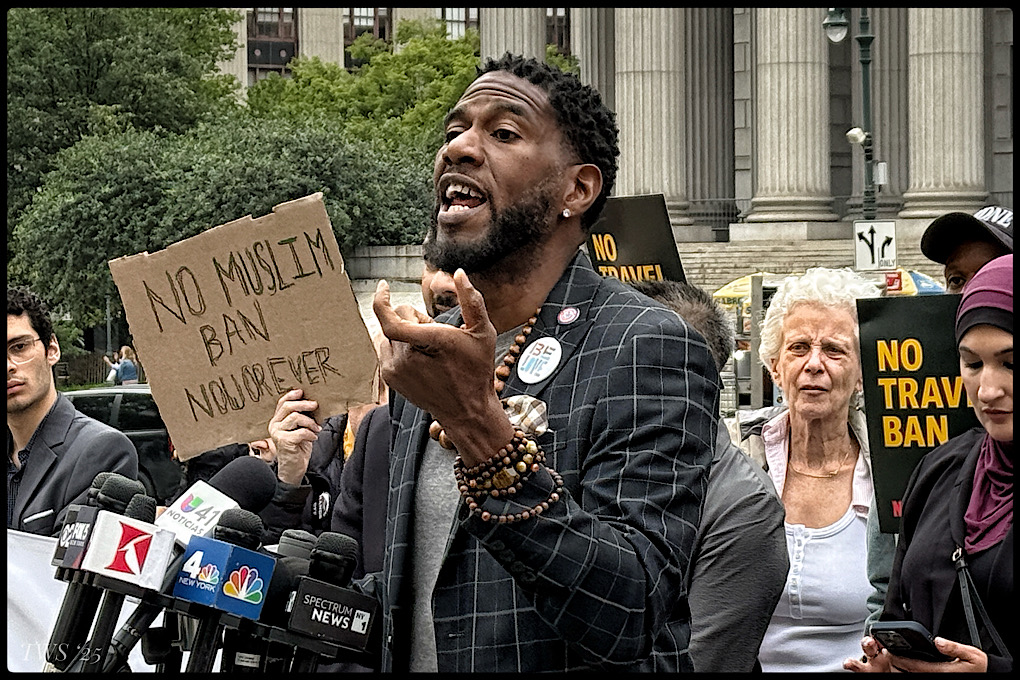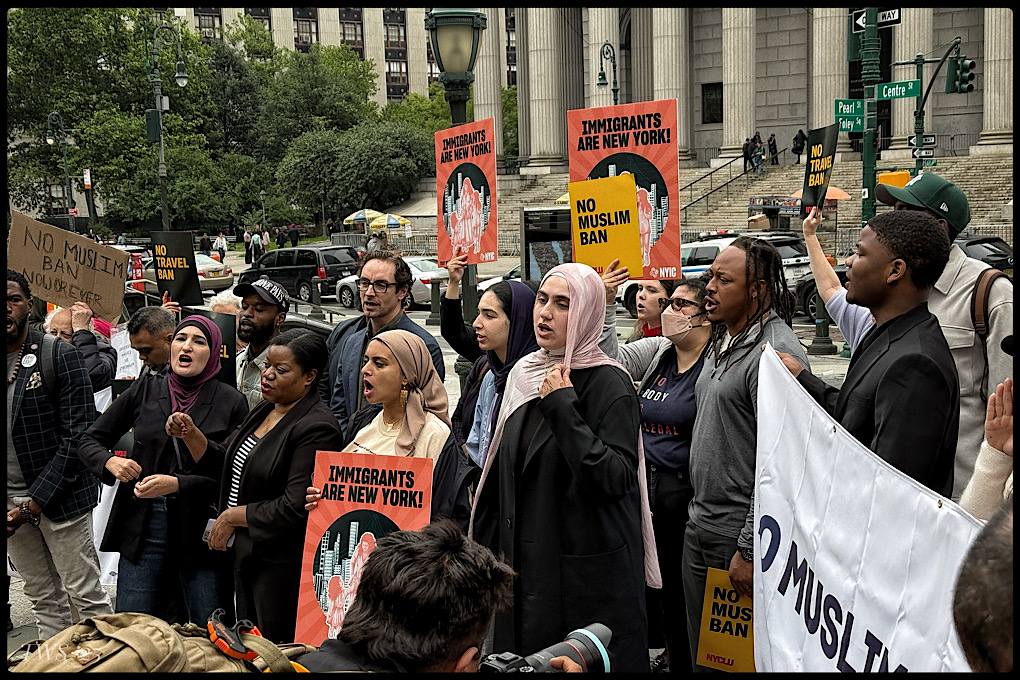Activists, advocates, labor leaders, and elected officials gathered at Foley Square on Monday to oppose the travel ban being implemented by the Trump administration. Standing at the center of where much of Trump’s immigration policy takes shape – Foley Square sits between the federal courthouse and Federal Plaza, where ICE plans and carries out operations – a number of speakers voiced their concerns and called for action on the same day that the ban goes into effect, restricting travel fully or in part for people from 19 countries.
“This is an incredibly unamerican policy,” said Murad Awawdeh, president and CEO of the New York Immigration Coalition, an umbrella policy and advocacy organization that represents over 200 immigrant and refugee rights groups throughout New York. “We will not stand idly by as the Trump administration tried to erase our communities, their contributions, and everything that this country has stood for.” The ban that went into effect on Monday was announced by President Trump last week via executive order, which stated that the measure was meant to “protect the national security and national interest of the United States and its people.”
A full travel ban is in effect for people from: Afghanistan, Burma, Chad, Republic of the Congo, Equatorial Guinea, Eritrea, Haiti, Iran, Libya, Somalia, Sudan, and Yemen. A partial ban limiting access to non-immigrant visas like tourist, business, and family-based visas is in effect for: Burundi, Cuba, Laos, Sierra Leone, Togo, Turkmenistan, and Venezuela. New York State is home to large shares of immigrant groups affected by the bans, including Haiti (16.2% of the national total), Yemen (19.9%), Togo (11.4%), and Venezuela (17.2%). Nearly all of the countries in the ban are living under some form of authoritarian rule, a civil war, or are in a state of extreme poverty. Some, like Haiti and Libya, lack a functioning government.
The move is a revival of an executive order from the beginning of Trump’s first term, which led to 60,000 visas being “provisionally revoked,” as well as the detention of over 700 travelers. Enforcement of the policy was stopped and revoked visas were re-validated after a successful lawsuit against the administration, although another executive order would be upheld by the Supreme Court in a 5-4 decision in 2018, which was revoked when Biden took office in 2021.

New York Public Advocate Jumaane Williams called out the new policy as racist. “White South Africans can be expedited here,” he said, referring to a recent move by the Trump administration to facilitate the entry of white South African farmers, falsely claiming that they are victims of targeted attacks that amount to genocide. “Other African countries and people from black and brown countries cannot, no matter what’s going on.”
Other speakers also talked more broadly of Trump’s hardline stance on immigration, which has reached new levels in recent weeks as masked ICE agents have begun raiding workplaces, detaining people off the street, and arresting immigrants showing up for their check-in appointments with the agency or at immigration court proceedings. Denis Johnston, a union leader with SEIU 32BJ, denounced the arrest of David Huerta, president of SEIU California, who was protesting the raids in Los Angeles over the weekend. “Every individual deserves to feel safe and secure in their own home, at work and within their community,” Johnston said. “These brutal military-style ICE raids are instilling fear in our friends and neighbors. This wave of terror must stop now.” Johnston announced that the union would be engaging in protest actions up and down the east coast in support of Huerta and denouncing the Trump administration’s hardline policies.
Williams, who became emotional as he spoke of his immigrant mother attending the rally, ended his speech with a call to action. “I’m pleading with everyone of good conscience, don’t just stand by and allow this to happen and wait till it comes for you, because it will. They are deporting citizens as well,” he said, referring to instances of young children born in the US with undocumented parents who have been forced out of the country, in blatant contravention of US law. “This is a tough time. We can get through it. We can. No one let go of anyone’s hands, and we’ll get through this together.”












